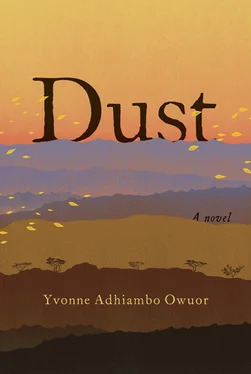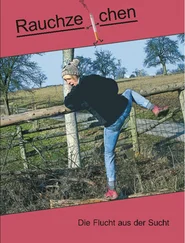The throbbing inside Ajany’s head ebbs.
AJANY COULD PAINT OVER THE SLICE OF CANVAS, COLOR OUT her mother. She chooses, instead, to bring the image into Nyipir’s dimly lit arena. She lifts the boma ’s thorn fence where Nyipir sits against his red dance-ox next to a small fire, propping up his head. The animal chews its cud. Nyipir inclines his head toward a teensy sound emerging from his medium-sized transistor radio. From time to time a phrase is strangled out. Piecemeal news. Ajany has carried a red blanket for him. She drops it around his shoulders.
“Ah!” he says, huddles into it.
Ajany says, “B-baba?”
“Mhh?”
A geyser of questions, a rushed tone. “His name’s Isaiah Bolton.… His father …”
“I know,” says Nyipir; he rubs his head and slouches.
Ajany crouches.
Nyipir indicates the radio. “Down-country, they’re chasing people from their homes. The ones who stay are being cut up and burned.”
No logic. Her mind grasps nothing. Her heart lurches.
Tears crease Nyipir’s face. His left hand hides them. “ Wuod Annan is here — listen — to help us.”
The radio spews static. Ajany strains to listen, draws her knees up. She hears minuscule sounds: the radio, her father, jumbled thoughts, the silent night. Perverse desolation. She shudders. More ghosts circling. Static. Kofi Annan’s voice weaving through in words that don’t connect: Parties … eminent persons … bloodshed … peace … violence … Peace … spoken … Honorable gentlemen … war … tribal … politics …
Nyipir says, voice crackling, “They know when a body is cooling.”
“Who?”
“Vultures.”
Within a dark nook in Nyipir’s heart, a long-ago man whispers, “By the time I’m done with you, you’ll become another. You’ll become mad. To live.” Nyipir shivers.
“Vultures.” Nyipir wipes his face with the blanket. “Baba?” Nyipir hears Ajany. He resurfaces. Stars fill the sky, maize meal white against dark violet.
Ajany asks, “Who’s Hugh Bolton? His books are in the house.”
Nyipir hesitates. Then, “We worked together long ago. Police.”
“The photograph …” she says, remembering the picture of Baba in uniform carrying the Kenyan flag, riding on a black horse.
“No, before.” Baba tilts his head back. “We shared … trouble .”
Fireflies land on memories. Images. Baba coming home from secret journeys, bearing gifts of livestock and assorted weapons like a fourth magus. Ritual display of changes in gun sizes, shapes, and weights. Concealment before sales. Plots and plans. Progression into steelier glints, smoother mechanisms. Smaller, lighter, more compact, faster off the mark, with and without silencers.
“Trouble?”
Baba’s voice is as parched as the Chalbi Desert. “The thing … Mau Mau …”
Ajany shifts, brows puckering. What?
Creaky-voiced: “And if I should speak, may the oath kill me.…”
“What?” she asks again.
Silence’s oaths, slow-dripping venom with their seductive promise of memory loss. Erasure of secrets, as long as the oath was fed in intermittent seasons with spilled human blood. “Ahhh! We bury evil with covenants of silence.” Nyipir says, “For the good of the country.” He explains, “We know, nyara , that to name the unnameable is a curse.”
Ajany hears his words, the spoken ones, those unspoken.
Nyipir adds, fingers gesturing, “Even if you plant another story into silence, see, the buried thing returns to ask for its blood from the living.” Nyipir’s laugh is short and dry. “Death does not keep its secrets well.”
Ajany rubs her eyes. When she had left Kenya, she had imagined an amputation from its riptide of murky things. But here they were again, expecting her reply. What was she now supposed to be? A memory. Odidi scaring her with stories of misshapen demons jealous of humanity that invade the earth scouring for human spare parts to use to replace their defects. Obarogo shopping for little girls’ eyes. She could paint this darkness and ogres emerging from petrified silence as she and Baba waded across swamps between life and the underworld.
Dung and heat; heady rain-on-earth tang.
Next to them, the red dance-ox grunts.
Nyipir’s silences have summoned the Forgotten. He wrestles, but in spite of his contortions, the Forgotten frog-march him into a lake of histories to retrieve rotting stories. “ They’ll return.” Nyipir supports his head with shaking hands; fingers shield his eyes.
“Who?” she asks, smelling Nyipir’s anguish.
“Aloys, Tom. Aloys and Tom.” Then he pleads, “Others are voiceless.”
Ajany picks a ghost: “Hugh Bolton?”
Nyipir gurgles.
“Bolton?” she repeats.
Nyipir is brusque. “I was going to Burma. Then I met him.”
Ajany draws circles into the ground with fingers. “What’s in Burma?”
Soft-voiced: “Our people. Went for King George’s war. Didn’t come back.”
Ajany draws lines. Listens.
“Was bringing them home.” Nyipir wipes his eyes.
Ajany scans black spaces between stars. She finds Kormamaddo, the bull camel of the waters, Odidi’s sky marker. “Myanmar,” she mutters.
“Mhh?”
“Burma is Myanmar.”
“ Myanmar ,” Baba says. “Mandalay, 21° 59′ N 96° 6′ E, Rangoon, 16° 47′ N 96° 9′ E.”
From the sky, Kormamaddo looks down on them.
“Yangon,” she adds.
“Who?”
“Rangoon is now Yangon.”
Nyipir sighs.
He asks, “This Isaiah … he’s gone?”
Ajany says, “No.”
“Tomorrow?”
She shakes her head.
“Where is he?”
“The house.”
A high-octave pitch. “ My house?”
Ajany is curt: “Odidi’s guest.”
Nyipir exhales, a whistling sound.
Ajany continues, “Odidi was coming here to meet him.…” A pause. “Odidi was coming home.”
Nyipir breathes into fresh tears. Rhhhhhhh .
An aging man dreams what could have been the right end of a broken-off conversation:
Where’s my son, my boy?
Here. Here he is .
Baba .
In dreams.
Odidi had wanted to subvert Nyipir’s hopes for his destiny. He had succeeded. Yet Odidi had been coming home. Nyipir no longer hears BBC’s World Service struggling through static to reach him. His son had come home.
Then.
Odidi’s absence seizes them both like an unconfessable sin. They peer through a night steeped in other silences. The unraveling.
Ajany opens her mouth to ask, Why is my brother dead? Nyipir opens his to beg her to leave the past behind.
They shut their mouths and eyes.
Then.
Nyipir tells Ajany, “Akai-ma must be on her way home. She’ll wonder where we are.”
They rise.
Nyipir says, “He must go.”
“Who?”
“ Musungu cha . Give him water, make him go.”
“Baba,” she replies, “Isaiah … he’s come with … Odidi gave him things. Books … and this …” She lifts the small canvas rectangle to Nyipir’s face. “Akai-ma.”
Nyipir becomes a wooden monolith.
He does not touch the piece.
He lurches away, minuet in movement, holding himself intact, leaving Ajany behind. Nyipir hums, “Par Oganda odong nono.” Sounds as if cawing crows are trapped inside him: “There’s nothing left of Oganda’s home.”
The canvas is damp in her hand. She stuffs it into her skirt pocket. She hurries to keep up with Nyipir, deluged with the fear of being left alone. Nose tickle. Fire in lungs. She spits. Wants to apologize for Odidi’s absence, for still living, for Akai-ma’s nakedness on a piece of canvas.
Читать дальше











